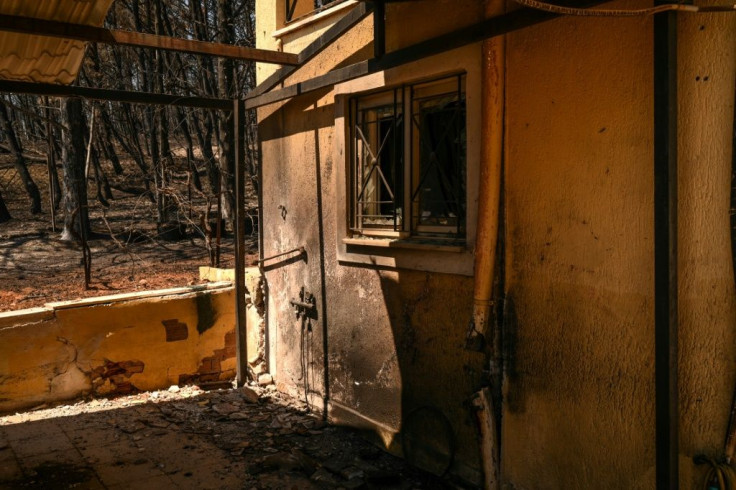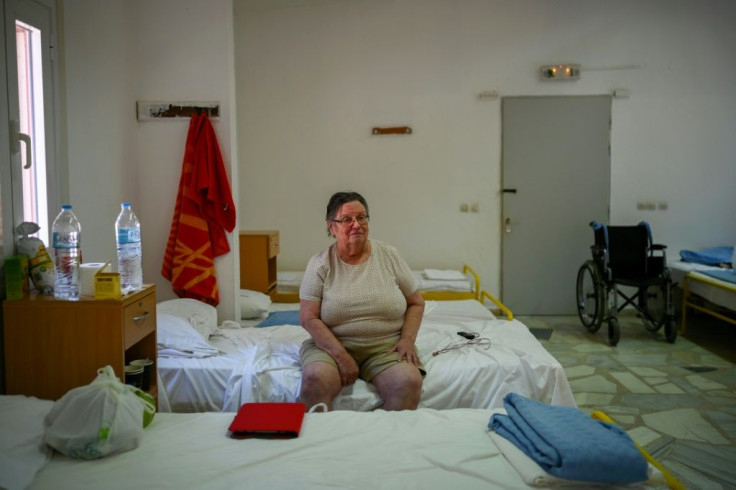Evicted By Fire, Greek Family Recalls Narrow Escape
In recent years, the pines had grown so much that the Haniosakis family could no longer see the Acropolis from their charming garden in Drosopigi, a small hamlet overlooking Athens.
"And now there she is again, because everything has gone up in smoke," Betty Haniosakis, 77, acknowledges bitterly, sitting on a bed in a nearby municipal summer camp where her family sheltered from the flames.
When the fire reached her home last week in a wave of blazes that would later engulf the island of Evia in the east and parts of the Peloponnese too, the danger did not seem too imminent at first.
The fire "came very slowly, there was not a bit of wind," recalls American-born Betty.
Residents of the sparsely-populated community had already received warning messages by cellphone from the civil protection authority to evacuate.

The police drove by once, twice. The third time they came over, there was no more time to dither.
"'You need to leave. Now,' they said," recalls Haniosakis' daughter Eleni, a 45-year-old teacher.
"That's when we knew it was very serious."
They were among hundreds forced to abandon their homes that week, unsure of whether they would see them again.

That week, Greece battled around 600 blazes, some of them "mega fires", Prime Minister Kyriakos Mitsotakis later explained.
With conditions on the ground bone-dry in the worst heatwave in decades, a fire in the forest of Varibobi near Athens roared back to life after being nearly subdued and spread to neighbouring Drosopigi.
Betty wanted to take refuge in the basement, shutting the doors and hiding under soaked blankets.
But her daughter persuaded her to flee alongside their three cats and three dogs. Her elderly husband Giorgos, 89 and in a wheelchair, had already left a day earlier.

The family found temporary lodgings in a summer camp for children that had been closed owing to the pandemic, and there they remain.
A groundswell of donations from around the country, from organisations and private citizens, poured in -- food, water, clothes, even free accommodation offers from hotels.
Asked when she might be able to return home, Betty Haniosakis said: "We don't know".
For the moment, officials have told her to stay put.
But Betty's daughter Eleni took AFP on a brief tour of the blackened family house, surrounded by skeletal tree remains.
The ground is strewn with dirty grey ash. The garden gone.
Through the heat haze and remnants of smoke, the Acropolis cannot be seen. But Eleni says that when those lift, the 2,500-year-old monument will be visible again.
"When I came back the first time (after the fire), at one point I didn't even recognise where I was," says Eleni. "It was hopeless."
In two weeks, more than 100,000 hectares of land went up in smoke in Greece, eating up buildings, pine forests, olive groves, beehives and livestock.
Mitsotakis has called the fires Greece's "greatest ecological disaster in decades," which he linked directly to climate change.
The government has pledged hundreds of millions of euros (dollars) in reconstruction, reforestation and flood prevention works.
Standing in front of the house, Eleni worries about how much climate change is causing these fires.
"I think it's the beginning of the end (...) How are we going to breathe in the future?" she says.
© Copyright AFP 2024. All rights reserved.







